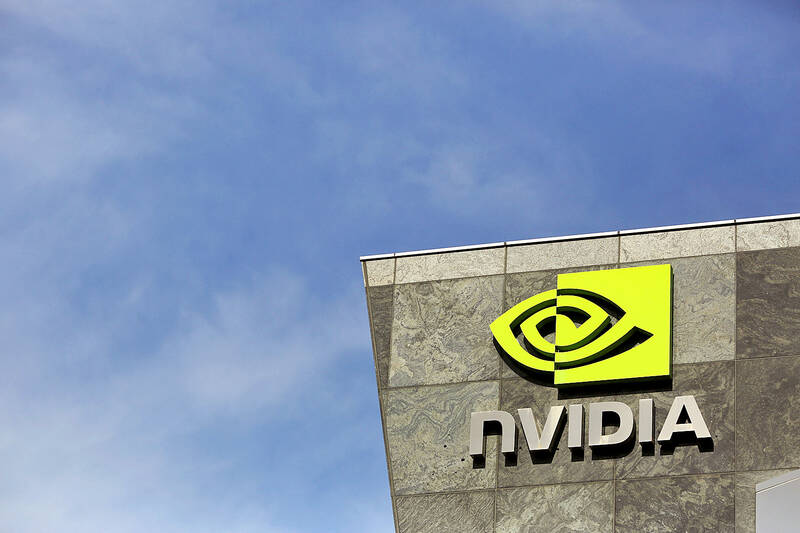Nvidia Corp dethroned Apple Inc as the world’s most valuable company on Friday following a record-setting rally in the stock, powered by insatiable demand for its specialized artificial intelligence (AI) chips.
Nvidia’s stock market value briefly touched US$3.53 trillion, slightly above Apple’s US$3.52 trillion, London Stock Exchange Group data showed.
Nvidia ended the day up 0.8 percent, with a market value of US$3.47 trillion, while Apple’s shares rose 0.4 percent, valuing the iPhone maker at US$3.52 trillion.

Photo: Reuters
In June, Nvidia briefly became the world’s most valuable company before it was overtaken by Microsoft Corp and Apple. The tech trio’s market capitalizations have been neck-and-neck for several months.
Microsoft’s market value stood at US$3.18 trillion, with its stock up 0.8 percent on Friday.
The Silicon Valley chipmaker is the dominant supplier of processors used in AI computing, and the company has become the biggest winner in a race between Microsoft, Alphabet Inc, Meta Platforms Inc and other heavyweights to dominate the emerging technology.
Known since the 1990s as a designer of processors for video games, Nvidia’s stock has risen about 18 percent so far this month, with a string of gains coming after OpenAI, the company behind ChatGPT, announced a funding round of US$6.6 billion.
Nvidia and other semiconductor stocks got a lift on Friday after data storage maker Western Digital Corp reported quarterly profit that beat analysts’ estimates, buoying optimism about data center demand.
“More companies are now embracing artificial intelligence in their everyday tasks and demand remains strong for Nvidia chips,” AJ Bell PLC investment director Russ Mould said.
“It is certainly in a sweet spot and so long as we avoid a big economic downturn in the United States, there is a feeling that companies will continue to invest heavily in AI capabilities, creating a healthy tailwind for Nvidia,” Mould said
Nvidia’s shares hit a record high on Tuesday, building on a rally from last week when Taiwan Semiconductor Manufacturing Co (台積電), the world’s largest contract chipmaker, posted a 54 percent jump in quarterly profit driven by soaring demand for chips used in AI.
Meanwhile, Apple is struggling with tepid demand for iPhone sales in China, which slipped 0.3 percent in the third quarter, while sales of phones made by rival Huawei Technologies Co (華為) surged 42 percent.
Shares of Nvidia have surged nearly 190 percent so far this year as the boom in generative AI led to a series of blowout forecasts from Nvidia.
“The question is whether the revenue stream will last for a long time and will be driven by the emotion of investors rather than by any ability to prove or disprove the thesis that AI is overdone,” Cherry Lane Investments LLC partner Rick Meckler said.
“I think Nvidia knows that near term, their numbers are likely to be quite remarkable,” he added.

CAUTIOUS RECOVERY: While the manufacturing sector returned to growth amid the US-China trade truce, firms remain wary as uncertainty clouds the outlook, the CIER said The local manufacturing sector returned to expansion last month, as the official purchasing managers’ index (PMI) rose 2.1 points to 51.0, driven by a temporary easing in US-China trade tensions, the Chung-Hua Institution for Economic Research (CIER, 中華經濟研究院) said yesterday. The PMI gauges the health of the manufacturing industry, with readings above 50 indicating expansion and those below 50 signaling contraction. “Firms are not as pessimistic as they were in April, but they remain far from optimistic,” CIER president Lien Hsien-ming (連賢明) said at a news conference. The full impact of US tariff decisions is unlikely to become clear until later this month

Popular vape brands such as Geek Bar might get more expensive in the US — if you can find them at all. Shipments of vapes from China to the US ground to a near halt last month from a year ago, official data showed, hit by US President Donald Trump’s tariffs and a crackdown on unauthorized e-cigarettes in the world’s biggest market for smoking alternatives. That includes Geek Bar, a brand of flavored vapes that is not authorized to sell in the US, but which had been widely available due to porous import controls. One retailer, who asked not to be named, because

CHIP DUTIES: TSMC said it voiced its concerns to Washington about tariffs, telling the US commerce department that it wants ‘fair treatment’ to protect its competitiveness Taiwan Semiconductor Manufacturing Co (TSMC, 台積電) yesterday reiterated robust business prospects for this year as strong artificial intelligence (AI) chip demand from Nvidia Corp and other customers would absorb the impacts of US tariffs. “The impact of tariffs would be indirect, as the custom tax is the importers’ responsibility, not the exporters,” TSMC chairman and chief executive officer C.C. Wei (魏哲家) said at the chipmaker’s annual shareholders’ meeting in Hsinchu City. TSMC’s business could be affected if people become reluctant to buy electronics due to inflated prices, Wei said. In addition, the chipmaker has voiced its concern to the US Department of Commerce

STILL LOADED: Last year’s richest person, Quanta Computer Inc chairman Barry Lam, dropped to second place despite an 8 percent increase in his wealth to US$12.6 billion Staff writer, with CNA Daniel Tsai (蔡明忠) and Richard Tsai (蔡明興), the brothers who run Fubon Group (富邦集團), topped the Forbes list of Taiwan’s 50 richest people this year, released on Wednesday in New York. The magazine said that a stronger New Taiwan dollar pushed the combined wealth of Taiwan’s 50 richest people up 13 percent, from US$174 billion to US$197 billion, with 36 of the people on the list seeing their wealth increase. That came as Taiwan’s economy grew 4.6 percent last year, its fastest pace in three years, driven by the strong performance of the semiconductor industry, the magazine said. The Tsai